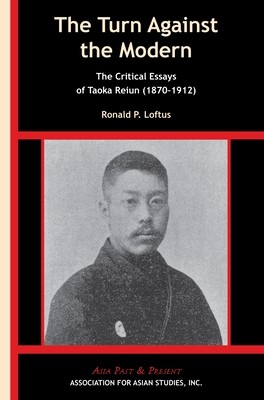
- We will send in 10–14 business days.
- Author: Ronald P Loftus
- Publisher: Association for Asian Studies
- Year: 2018
- Pages: 315
- ISBN-10: 0924304847
- ISBN-13: 9780924304842
- Format: 15.2 x 22.9 x 1.8 cm, minkšti viršeliai
- Language: English
- SAVE -10% with code: EXTRA
Reviews
Description
The Turn Against the Modern is a biography of the late Meiji social and cultural critic Taoka Reiun (1870-1912) who was known for his fierce attack on modernity. Reiun was convinced that the western conception of modernity in the late nineteenth and early twentieth century was based on an overly narrow, materialistic view of the world--one that placed far too much emphasis on commerce, profit, and utilitarianism--and he believed that this concept was rapidly emptying life of its richness, depth, and meaning. He, therefore, could not help but decry a world that had "squandered its spirit and vitality, forsaken its grandiose visions, and lost its sense of mystery, its very soul!" A careful reader of philosophy, religion, and literature, Reiun embraced a vision of history, society, and the future that marks him as an original and creative thinker whose understanding of what it means to be modern and human remains alive and vital today. This study vividly brings to life an overlooked contrarian whose writings tell us that Japan's modernization process was much more complex and controversial than the standard 'Meiji progress narrative' would have us believe. Taoka Reiun comes through in this exhaustively researched study as a powerful critic who thought capitalist materialism had robbed Japan of its soul--a much-censored opponent of slavish Westernization who insisted that modernity should spring from the creation of autonomous individuals (women as well as men). Loftus's analysis is incisive; his attention to Reiun's tumultuous personal life brings special energy to the work.
EXTRA 10 % discount with code: EXTRA
The promotion ends in 23d.20:36:02
The discount code is valid when purchasing from 10 €. Discounts do not stack.
- Author: Ronald P Loftus
- Publisher: Association for Asian Studies
- Year: 2018
- Pages: 315
- ISBN-10: 0924304847
- ISBN-13: 9780924304842
- Format: 15.2 x 22.9 x 1.8 cm, minkšti viršeliai
- Language: English English
The Turn Against the Modern is a biography of the late Meiji social and cultural critic Taoka Reiun (1870-1912) who was known for his fierce attack on modernity. Reiun was convinced that the western conception of modernity in the late nineteenth and early twentieth century was based on an overly narrow, materialistic view of the world--one that placed far too much emphasis on commerce, profit, and utilitarianism--and he believed that this concept was rapidly emptying life of its richness, depth, and meaning. He, therefore, could not help but decry a world that had "squandered its spirit and vitality, forsaken its grandiose visions, and lost its sense of mystery, its very soul!" A careful reader of philosophy, religion, and literature, Reiun embraced a vision of history, society, and the future that marks him as an original and creative thinker whose understanding of what it means to be modern and human remains alive and vital today. This study vividly brings to life an overlooked contrarian whose writings tell us that Japan's modernization process was much more complex and controversial than the standard 'Meiji progress narrative' would have us believe. Taoka Reiun comes through in this exhaustively researched study as a powerful critic who thought capitalist materialism had robbed Japan of its soul--a much-censored opponent of slavish Westernization who insisted that modernity should spring from the creation of autonomous individuals (women as well as men). Loftus's analysis is incisive; his attention to Reiun's tumultuous personal life brings special energy to the work.


Reviews